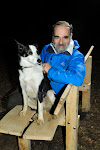
Visiting the Memorial to the Shoa in Paris
Sitting having a coffee by the Seine with Notre Dame behind me I keep thinking of the lines of Paul Celan: “Your golden hair Margareta, your ashen hair Shulamith”
The effect of visiting the memorial to the Shoa prays on us all. Mossy and I are held up outside at security. We have rucksacks and the machine for examining bags has broken down. There’s an irony about Jews who fled Germany being stopped from entering here. Eventually the young, frum man in charge asks me if I know what the week’s Sidra is, and we’re let in,
Philippe, a member of the Masorti congregation in Paris, guides us. His mother was hidden during the war. Rabbi Krygier explains how his father was saved from deportation by a strange man who at first terrified him. It turned out to be a priest. This man moved him from hiding place to hiding place until the liberation risking his own life many times. I’ve been reading Lisa Fittko’s account of the war years in France. Young, Jewish, active in the political Resistance against Hitler, she fled Germany in 1933. She describes the round up of enemy aliens in the Velodrome D’Hiver, the camp at Gurs. The mass escape, as the French have more urgent preoccupations in the place of the route and the armistice, the confusion. How do you make plans to escape when you have no money, no papers, and don’t know where your loved ones are?
An intrepid sparrow sits on a wrought iron hanger right next to our table. Mossy takes out his camera but the bird is gone. You’ll never capture me. I have wings to protect my freedom!
The Seine rocks the moored boat come café where we are sitting. The onset of darkness is making the fading daylight more intense.
The effect of visiting the memorial to the Shoa prays on us all. Mossy and I are held up outside at security. We have rucksacks and the machine for examining bags has broken down. There’s an irony about Jews who fled Germany being stopped from entering here. Eventually the young, frum man in charge asks me if I know what the week’s Sidra is, and we’re let in,
Philippe, a member of the Masorti congregation in Paris, guides us. His mother was hidden during the war. Rabbi Krygier explains how his father was saved from deportation by a strange man who at first terrified him. It turned out to be a priest. This man moved him from hiding place to hiding place until the liberation risking his own life many times. I’ve been reading Lisa Fittko’s account of the war years in France. Young, Jewish, active in the political Resistance against Hitler, she fled Germany in 1933. She describes the round up of enemy aliens in the Velodrome D’Hiver, the camp at Gurs. The mass escape, as the French have more urgent preoccupations in the place of the route and the armistice, the confusion. How do you make plans to escape when you have no money, no papers, and don’t know where your loved ones are?
An intrepid sparrow sits on a wrought iron hanger right next to our table. Mossy takes out his camera but the bird is gone. You’ll never capture me. I have wings to protect my freedom!
The Seine rocks the moored boat come café where we are sitting. The onset of darkness is making the fading daylight more intense.
I think it was in Paris by the Seine that the darkness which had been haunting Paul Celan overcame him: “Death is a master from Germany; your golden Margareta, your ashen hair Shulamith”

No comments:
Post a Comment